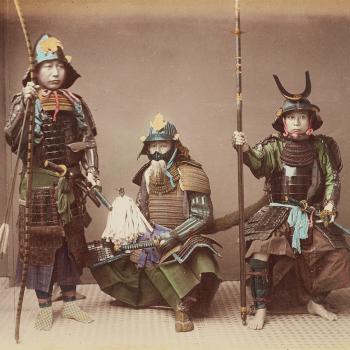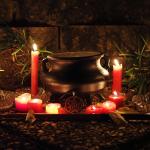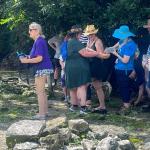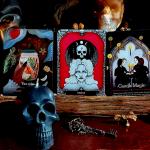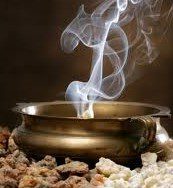 Several years ago I used to chide my friends about doing “Pagan things.” We were all Pagans, but none of us were really “practicing Pagans.” Many of us (myself included) had gotten away from doing ritual and participating in Pagan groups. About all we did together as Pagans was head out to festivals like Sirius Rising and Starwood, and our own Beltane rites. I have no idea what was going on internally with my friends, but on the outside it looked like we were all floundering.
Several years ago I used to chide my friends about doing “Pagan things.” We were all Pagans, but none of us were really “practicing Pagans.” Many of us (myself included) had gotten away from doing ritual and participating in Pagan groups. About all we did together as Pagans was head out to festivals like Sirius Rising and Starwood, and our own Beltane rites. I have no idea what was going on internally with my friends, but on the outside it looked like we were all floundering.
Times change, and as long as you stay on the path there’s a chance you’ll find yourself ending up somewhere; it may not be where you originally intended to go, but it might very well be the ideal arrival point. Last February I watched many of those same people lead a lovely ADF Rite at ConVocation in Michigan (an indoor festival), and it was just so satisfying to see all of my old friends participating in and doing “Pagan things.” About the time they all got involved with ADF, my wife and I were beginning our journey into British Traditional Witchcraft. Very different paths, but both are very much “Pagan things,” and while it meant we didn’t all do ritual so much anymore, it ended up bringing us closer together. Suddenly we were all experiencing the gods externally again, and while our methods for getting theere were different, at least there were methods to talk about.
I’ll admit to sometimes spending more time writing and reading about Paganism than actively participating in it. I’m an obsessive reader (especially when working on a project), and have been know to disappear for weeks at a time inside particular corners of history. (When working on a Magick and the Occult in America workshop this past fall/winter I spent weeks at a time immersed in books about Mormonism, Conjure, and Spiritualism.) When I begin to get lost in history and find myself stepping away from the gods I remember an idea I first ran into in a Scott Cunningham book: “Reading about Paganism is not the same thing as actually practicing it.”
 One of the things I’ve always tried to get across in this blog is that I do Pagan things. I do ritual two or three times a month, and I share many of those rituals here. (I try to post a sabbat ritual every turn of the Wheel.) I not only worship and honor the gods, but I experience the gods. I’m never sure if I ever completely articulate the power of those experiences, but I do my best. I know that writing about some of them has literally brought me to tears (just as I’m sure some of my typos have brought you to tears dear reader). On the outside it might sometimes look like my Paganism is wrapped up in Led Zeppelin and hard cider, but internally it’s always been about deity. Ritual plays a large role in that because it’s how I most often experience the gods, but we (the gods and I) have our moments outside of circle.
One of the things I’ve always tried to get across in this blog is that I do Pagan things. I do ritual two or three times a month, and I share many of those rituals here. (I try to post a sabbat ritual every turn of the Wheel.) I not only worship and honor the gods, but I experience the gods. I’m never sure if I ever completely articulate the power of those experiences, but I do my best. I know that writing about some of them has literally brought me to tears (just as I’m sure some of my typos have brought you to tears dear reader). On the outside it might sometimes look like my Paganism is wrapped up in Led Zeppelin and hard cider, but internally it’s always been about deity. Ritual plays a large role in that because it’s how I most often experience the gods, but we (the gods and I) have our moments outside of circle.
We do a lot of things very well in the Pagan Blogosphere. We’re great at sharing opinions and hashing out our internal squabbles, but what we so rarely do is express those greater moments, those times when we do and experience Pagan things. It’s great to litigate the Pagan Umbrella, but how did you end up under that umbrella in the first place? Who are your gods and what’s your practice? I like pondering the weird and wonderful questions of Paganism as much as the next person, but your opinion is going to matter so much more to me if I know how you got to here.
 Many of us Pagan-writer-types often place more emphasis on the about than the why, which means we sometimes simply write about Paganism instead of writing about the experience of Paganism. If calling the ancestors in ritual is important to you, I want more than just historical precedent, I need to know why you do it and how it makes you feel. History is most definitely interesting, but the real Pagan thing is how a certain experience affects us. I don’t do things in circle because I’ve been taught to do them a certain way, I do them because they feel right, and when they feel right I experience them.
Many of us Pagan-writer-types often place more emphasis on the about than the why, which means we sometimes simply write about Paganism instead of writing about the experience of Paganism. If calling the ancestors in ritual is important to you, I want more than just historical precedent, I need to know why you do it and how it makes you feel. History is most definitely interesting, but the real Pagan thing is how a certain experience affects us. I don’t do things in circle because I’ve been taught to do them a certain way, I do them because they feel right, and when they feel right I experience them.
Practicing Paganism is not like fixing a watch; it’s an intuitive process, not a mechanical one. If you honor a particular god I have to assume that there’s a story behind it, unless you simply picked their name(s) out of a hat. That experience of being called to by deity is a very real Pagan thing. For me, there’s no way I could even write Raise the Horns if I was not allowed to write about Pan. He’s not just “my deity,” he’s a part of me and who I am. I’m sitting on my porch while I write this and I can just about make him out in the pine trees on the other side of the street.
Last night when my wife and I stepped into our house after a long evening walk I stopped for a minute to admire the fireplace mantle/altar we have decked out for Aphrodite and Dionysus. In that second I felt them in my home, near us. It often feels like there’s some sort of weird hesitancy out there in the online Pagan-world to write about how we experience the divine. To me, that experience is the essence of Paganism. None of us would be here without it.
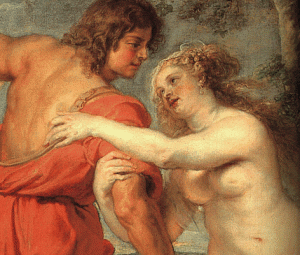 I think we often misplace the wonder in Modern Paganism for whatever reason. We write about how we think others should honor the gods instead of how we honor the gods. The smartest teacher I ever had in the Craft never “taught” us anything, she simply shared where she had been, and then left it all up to us. If we wanted to follow in her footsteps we followed because her voice and her eyes told us that where she had been was true. We knew that she was not one to simply read about Paganism, but that she was one who was doing Pagan things. The wisdom and authority of “been there done that” should never be overlooked. Modern Paganism isn’t a clinical exercise, it’s a spiritual one.
I think we often misplace the wonder in Modern Paganism for whatever reason. We write about how we think others should honor the gods instead of how we honor the gods. The smartest teacher I ever had in the Craft never “taught” us anything, she simply shared where she had been, and then left it all up to us. If we wanted to follow in her footsteps we followed because her voice and her eyes told us that where she had been was true. We knew that she was not one to simply read about Paganism, but that she was one who was doing Pagan things. The wisdom and authority of “been there done that” should never be overlooked. Modern Paganism isn’t a clinical exercise, it’s a spiritual one.
Every day I try to find a moment to experience a Pagan thing. Sometimes it’s a small moment like listening to the world around me, or experiencing an emotion or feeling that connects me to greater things. Other days it’s an encounter with the gods and I get to make love to Aphrodite herself. I love knowing a little Pagan history and I’ll never give up on that aspect of the journey, but what I love even more are the gods, this world, and doing the things that make me a Pagan.







